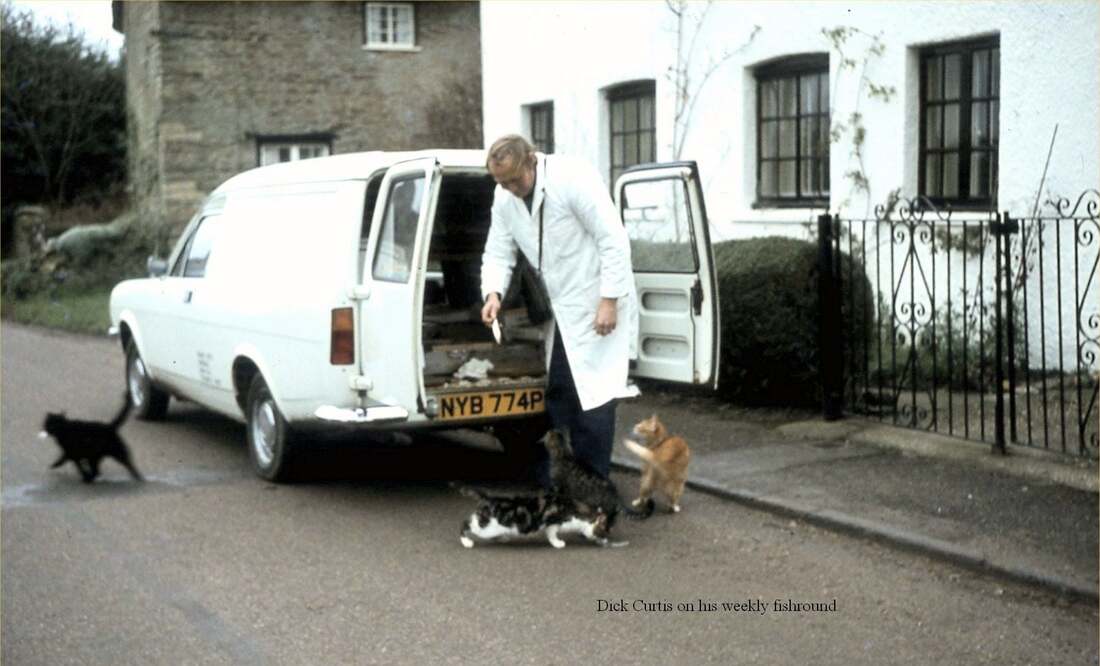Delivery Men in the Stalbridge Area in the Inter War Years
In addition to Dike’s and Bryant’s bakeries, and the Stalbridge butchers, Sydney Eavis and Fred Bugg, many other tradesmen delivered supplies to the door on a regular basis.
Sydney Parsons, at Stalbridge Weston, set up his butchery business on his return from the 1st World War, specialising in poultry, rabbits and eggs, and also retailed meat.
The ringing of a loud bell, would herald the arrival of a travelling bazaar from Wimborne Minster. The motor van was large and the carrying capacity increased by fitting an external wooden framework to both sides of the vehicle, in which was carried racks of crockery packed in straw. Saucers, plates, dishes, pots, pans, buckets, brushes, soap and a hundred other items were carried inside the van. Earthen ware pots were hung by the handle from hooks along the rows of shelves. A glass case had been built in behind the driver’s seat to house the more special items that a customer might ask for. The salesman would use a ‘u’ shaped attachment on the end of a pole, for lifting down such items as buckets and large jugs. The proprietor made use of the roof space by erecting a guardrail around the perimeter, providing a suitable location for the storage of a small stock of his larger wares. Access to the roof area was by means of a vertically fixed ladder on the side of the vehicle.
A chimney sweep visited Stalbridge, and outlying farms and hamlets, with a small donkey cart. He trudged from job to job, transporting the tools of his trade on the cart. A donkey and cart was sometimes parked outside one of the public houses at lunchtime. The owner made his living from offering bloaters in exchange for rags and bones and the skins of moles and rabbits. Old Jack was a well-known character selling reels of cotton thread, skeins of wool and sewing needles from a tray suspended from around his neck by a leather strap.
A copy of the “Old Moore’s Almanac” could be purchased from a man who would visit Stalbridge every autumn throughout the 1920s. He would go from door to door, departing at the end of the day in time to catch the last train from Stalbridge station. Gypsy families were regular visitors. The men were mainly horse dealers and made wooden clothes pegs and artificial flowers for their womenfolk to sell on the doorstep. These women were never at a loss for words when it came to a tale of woe, especially if they were trying to persuade someone to either buy their wares, or begging for some cast-off clothing.
On many a summer’s Sunday afternoon, a group of noisy men could be heard shouting out: “Fresh Weymouth Mackerel”. They must have done good business, judging by the large number of people who went to the back of their lorry, with a china plate in one hand and a small amount of money in the other, checking first that the quality of the fish had not deteriorated during transit.
Herby Parsons, a fishmonger, had a weekly delivery round in Stalbridge and the surrounding area, his means of transport was a pony and cart. Herby had lost a leg on active service in the 1stWorld War, and set up his business shortly after returning to Stalbridge. Herby was a fanatical supporter of Stalbridge Football club. He was always standing on the touchline for home matches and I remember him for shouting ‘Shaftesbury’ every time an opposing team player’s shot for goal was off target. At one match, he was so incensed at a foul committed by one of the opposing team’s players that he encroached on to the pitch, in pursuit of the offender, brandishing his walking stick in a threatening manner, until the referee intervened and escorted him back to the touchline.
A man from Shaftesbury used to visit Stalbridge twice a year on his specially adapted bicycle, to use as a mobile workbench, for sharpening knives, scissors and shears. He would operate this contraption by setting the cycle firmly onto its stand and then using the pedals to drive the belts and pulleys to turn the grindstone. Three men would arrive in a lorry and then go from door to door trying to sell floor mats of all sizes, rolls of linoleum and coconut matting.
One particular horse-drawn cart had the unmistakable smell of death about it. It was known as the ‘Knackers cart’. This purpose built cart was used for the transportation of dead cattle and horses to the kennels at Inwood House, at Henstridge, for feeding to the fox hounds belonging to the Merthyr Guest Hunt.
Three coal merchants delivered coal from the railway station to households in Stalbridge and the surrounding area. One had a lorry while the other two still relied on a horse and wagon. During the winter months one coal man would seldom return home without a cartload of hazel sticks bought from a local farmer. These sticks were eventually sold forty to the bundle, for use as runner bean sticks and for supporting peas.
Two men delivered cleaning materials, for use in the home and also paraffin, for heating, cooking and lighting. These men were known to us as being “the Oil Men”. Norman Brown delivered paraffin for Meaders by means of a motorbike and sidecar. A Mr Wilcox, from Bishops Caundle, also had an oil delivery round in the Stalbridge area. Mr Kendall, from New Street Marnhull, sold pots and pans, along with brass and china ornaments.
Philip Knott 2021
Sydney Parsons, at Stalbridge Weston, set up his butchery business on his return from the 1st World War, specialising in poultry, rabbits and eggs, and also retailed meat.
The ringing of a loud bell, would herald the arrival of a travelling bazaar from Wimborne Minster. The motor van was large and the carrying capacity increased by fitting an external wooden framework to both sides of the vehicle, in which was carried racks of crockery packed in straw. Saucers, plates, dishes, pots, pans, buckets, brushes, soap and a hundred other items were carried inside the van. Earthen ware pots were hung by the handle from hooks along the rows of shelves. A glass case had been built in behind the driver’s seat to house the more special items that a customer might ask for. The salesman would use a ‘u’ shaped attachment on the end of a pole, for lifting down such items as buckets and large jugs. The proprietor made use of the roof space by erecting a guardrail around the perimeter, providing a suitable location for the storage of a small stock of his larger wares. Access to the roof area was by means of a vertically fixed ladder on the side of the vehicle.
A chimney sweep visited Stalbridge, and outlying farms and hamlets, with a small donkey cart. He trudged from job to job, transporting the tools of his trade on the cart. A donkey and cart was sometimes parked outside one of the public houses at lunchtime. The owner made his living from offering bloaters in exchange for rags and bones and the skins of moles and rabbits. Old Jack was a well-known character selling reels of cotton thread, skeins of wool and sewing needles from a tray suspended from around his neck by a leather strap.
A copy of the “Old Moore’s Almanac” could be purchased from a man who would visit Stalbridge every autumn throughout the 1920s. He would go from door to door, departing at the end of the day in time to catch the last train from Stalbridge station. Gypsy families were regular visitors. The men were mainly horse dealers and made wooden clothes pegs and artificial flowers for their womenfolk to sell on the doorstep. These women were never at a loss for words when it came to a tale of woe, especially if they were trying to persuade someone to either buy their wares, or begging for some cast-off clothing.
On many a summer’s Sunday afternoon, a group of noisy men could be heard shouting out: “Fresh Weymouth Mackerel”. They must have done good business, judging by the large number of people who went to the back of their lorry, with a china plate in one hand and a small amount of money in the other, checking first that the quality of the fish had not deteriorated during transit.
Herby Parsons, a fishmonger, had a weekly delivery round in Stalbridge and the surrounding area, his means of transport was a pony and cart. Herby had lost a leg on active service in the 1stWorld War, and set up his business shortly after returning to Stalbridge. Herby was a fanatical supporter of Stalbridge Football club. He was always standing on the touchline for home matches and I remember him for shouting ‘Shaftesbury’ every time an opposing team player’s shot for goal was off target. At one match, he was so incensed at a foul committed by one of the opposing team’s players that he encroached on to the pitch, in pursuit of the offender, brandishing his walking stick in a threatening manner, until the referee intervened and escorted him back to the touchline.
A man from Shaftesbury used to visit Stalbridge twice a year on his specially adapted bicycle, to use as a mobile workbench, for sharpening knives, scissors and shears. He would operate this contraption by setting the cycle firmly onto its stand and then using the pedals to drive the belts and pulleys to turn the grindstone. Three men would arrive in a lorry and then go from door to door trying to sell floor mats of all sizes, rolls of linoleum and coconut matting.
One particular horse-drawn cart had the unmistakable smell of death about it. It was known as the ‘Knackers cart’. This purpose built cart was used for the transportation of dead cattle and horses to the kennels at Inwood House, at Henstridge, for feeding to the fox hounds belonging to the Merthyr Guest Hunt.
Three coal merchants delivered coal from the railway station to households in Stalbridge and the surrounding area. One had a lorry while the other two still relied on a horse and wagon. During the winter months one coal man would seldom return home without a cartload of hazel sticks bought from a local farmer. These sticks were eventually sold forty to the bundle, for use as runner bean sticks and for supporting peas.
Two men delivered cleaning materials, for use in the home and also paraffin, for heating, cooking and lighting. These men were known to us as being “the Oil Men”. Norman Brown delivered paraffin for Meaders by means of a motorbike and sidecar. A Mr Wilcox, from Bishops Caundle, also had an oil delivery round in the Stalbridge area. Mr Kendall, from New Street Marnhull, sold pots and pans, along with brass and china ornaments.
Philip Knott 2021



